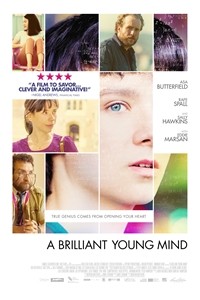 A Brilliant Young Mind
A Brilliant Young Mind
Starring: Asa Butterfield, Eddie Marsan, Rafe Spall, Sally Hawkins, Martin McCann, Christina Low, Alexa Davies
Director: Morgan Matthews
Release Date: 09/25/15
By Michael Clawson of Terminal Volume
It’s entirely possible that the world’s most brilliant mind is in the body of a child. And also imprisoned behind a veil of paralyzing awkwardness.
In A Brilliant Young Mind we’re introduced to a number of worthy candidates, all of whom are trying to out-awkward each other with cold facts, debilitating shyness and enough social tics they could be charted into “trigonometric identities,” or whatever that is.
Nathan (Asa Butterfield) is one of these young people. The British lad sees the world in geometry, algebra and calculus. He’s by all estimates a genius, yet he can barely function in the real world. When his mother orders take-out if the fish sticks and chips aren’t positioned symmetrically and in prime numbers then he flips out.
He’s guided by teacher Martin Humphreys (Rafe Spall, son of Timothy), who suggests he participate in a mathematics olympiad for the most brilliant young pupils. Nathan takes the test, passes and soon finds himself in Taiwan studying with other mathletes his age. He gets a crude wake-up when his fried prawns are delivered in an eight-count container … so close to a prime number, but yet not.
The film dips into darker territory as the characters open up and reveal their even more fragile cores. One boy, Luke, is likely autistic, which leads to bullying even in these nerdy circles. A Chinese student that Nathan is paired with is harassed because her uncle is the director of the team. Nathan’s issue is just communicating on a basic level. He mumbles, recoils at the lightest touch and his eyes reveal sparkles of brilliant pain. This wounded kid is thrown into a new culture and he remarkably thrives, which breaks the heart of his mother (Sally Hawkins), who can’t seem to understand why he’ll open up to everyone but her.
Of course, the film all boils down to the math olympiad, but then it’s not that simple. It’s written with care and truth, and no “big game” sports climax will ever solve all the issues swirling around in this layered and pristinely textured script by James Graham. There is some cliche, including a “surprise car crash” still in the clamshell packaging and a race to the train station to get the girl, but even those conventions are given new spins, fresh perspectives.
The math is dense and confusing, and is barely explained outside of one sequence in which Nathan turns a card trick into a binary matrix. In other scenes the equations are just glossed over in broad strokes. I knew it was complex stuff, though, because the math problems had more letters than numbers, and brackets within brackets within brackets. “If truth is beauty and beauty is truth, then surely mathematics is the most beautiful thing in the world,” says an olympiad leader played by the great Eddie Marsan. I’ll take your word for it.
Although the surface of this coming-of-age story is rather blandly paced and acted, there are deeper currents of emotional agony that are running through this film. Scratch but a tiny bit down and it opens some terrifying places related to love, family, success and acceptance. But in the end, like math, it has an inherent beauty to all of it.

 Interview – Oren Moverman, director “Time Out of Mind”
By Jeff Mitchell
Interview – Oren Moverman, director “Time Out of Mind”
By Jeff Mitchell people. New York is quite an overwhelming city in terms of the mass volume of humanity in your face all the time. The more people there are, the more alone you can be. When you have so many people (in one place), then they (simply) do not see each other. So, I think the state of homelessness - that kind of isolation - leads to deprivation of very basic needs. The lack of eye contact or human contact just makes the problem worse for sure.
people. New York is quite an overwhelming city in terms of the mass volume of humanity in your face all the time. The more people there are, the more alone you can be. When you have so many people (in one place), then they (simply) do not see each other. So, I think the state of homelessness - that kind of isolation - leads to deprivation of very basic needs. The lack of eye contact or human contact just makes the problem worse for sure.  OM: That was our biggest worry: Are we going to get away with putting Richard Gere in this environment. We tested it. What we discovered – when we hid the camera, because we didn’t want the camera in people’s faces to give away the fact that we’re shooting a movie - is they didn’t recognize him at all because they didn’t look at him. It was a very deliberate, very understandable, very human, and a very New York approach. Urban dwellers would just walk past this homeless guy, and maybe someone would pay attention and maybe someone would give something, but ultimately no one looked him in the eye. It wasn’t as if he was unrecognizable as Richard Gere. He was unrecognizable as a movie star, for sure. He was unrecognizable in his clothes because that’s not how you would expect to see Richard Gere. The fact that no one looked him in the eye, it was a lesson for us when someone in that position becomes quite invisible to the people around him. He did get recognized twice in Grand Central Terminal when two people walked by him and said, “Hello”. It wasn’t sort of “Oh my God, it’s a movie star. Let me take a picture.” It was more like, “Hey, he looks like Richard Gere. It looks like he is having a hard time.”
OM: That was our biggest worry: Are we going to get away with putting Richard Gere in this environment. We tested it. What we discovered – when we hid the camera, because we didn’t want the camera in people’s faces to give away the fact that we’re shooting a movie - is they didn’t recognize him at all because they didn’t look at him. It was a very deliberate, very understandable, very human, and a very New York approach. Urban dwellers would just walk past this homeless guy, and maybe someone would pay attention and maybe someone would give something, but ultimately no one looked him in the eye. It wasn’t as if he was unrecognizable as Richard Gere. He was unrecognizable as a movie star, for sure. He was unrecognizable in his clothes because that’s not how you would expect to see Richard Gere. The fact that no one looked him in the eye, it was a lesson for us when someone in that position becomes quite invisible to the people around him. He did get recognized twice in Grand Central Terminal when two people walked by him and said, “Hello”. It wasn’t sort of “Oh my God, it’s a movie star. Let me take a picture.” It was more like, “Hey, he looks like Richard Gere. It looks like he is having a hard time.”  Black Mass
Black Mass
 Everest
Everest
 Sleeping with Other People
Sleeping with Other People
 The Visit
The Visit
 Director: Ken Kwapis
Director: Ken Kwapis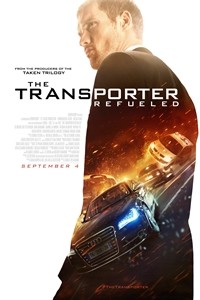 The Transporter Refueled
The Transporter Refueled
 “’Learning to Drive’ never quite moves out of the slow lane”
“’Learning to Drive’ never quite moves out of the slow lane”
 Turbo Kid
Turbo Kid

 Digging for Fire
Digging for Fire
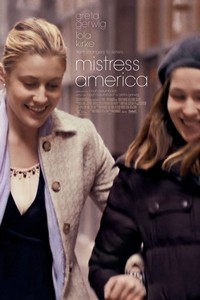 Mistress America
Mistress America
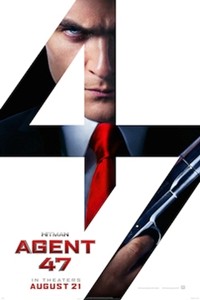 “’Hitman: Agent 47’ stands out for about 47 painful reasons”
“’Hitman: Agent 47’ stands out for about 47 painful reasons”
 American Ultra
American Ultra
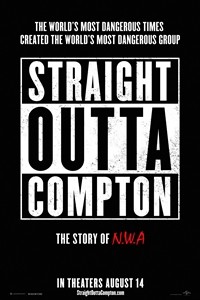 Straight Outta Compton
Straight Outta Compton








